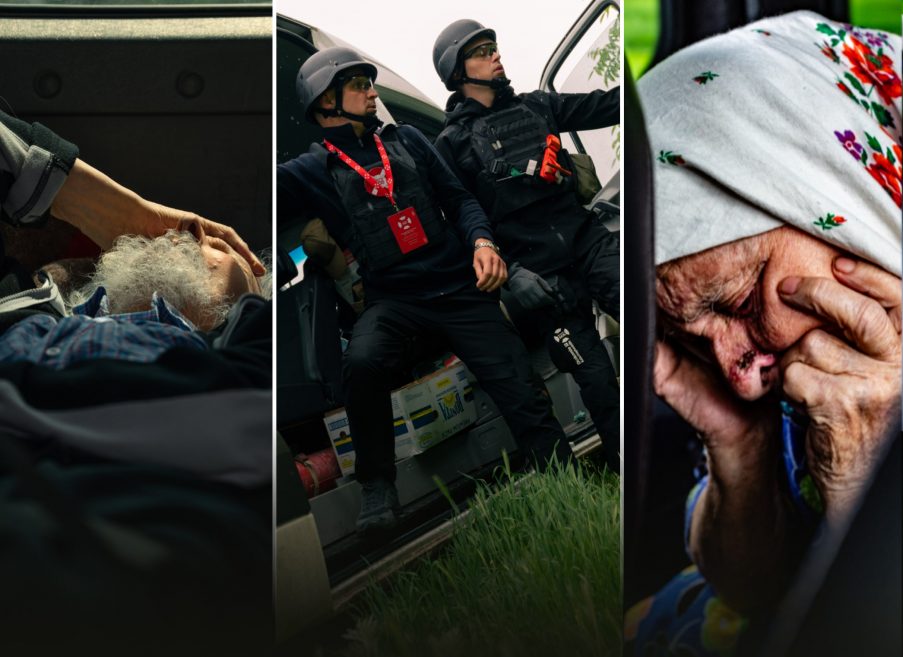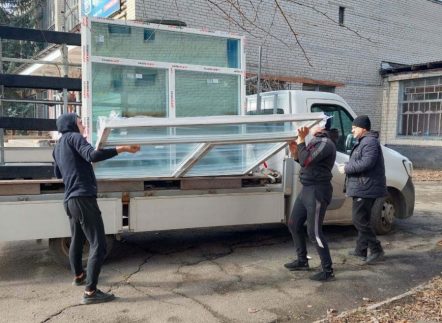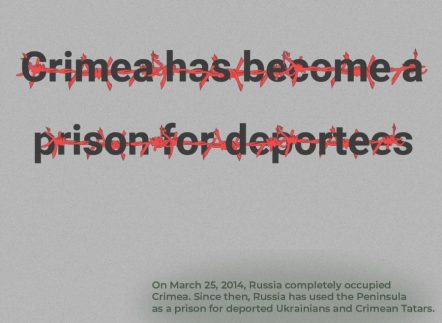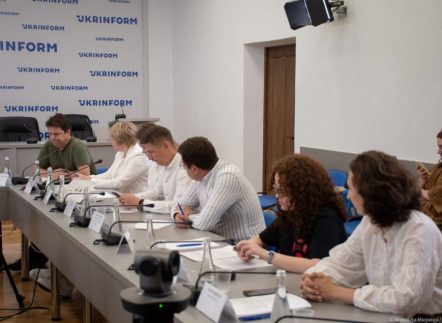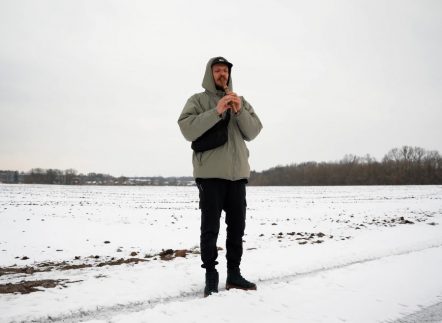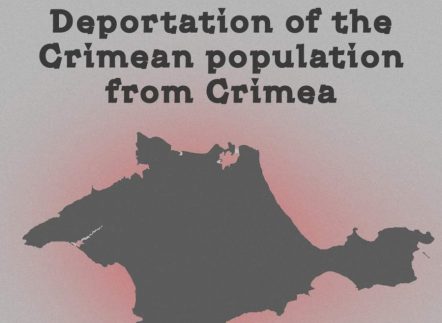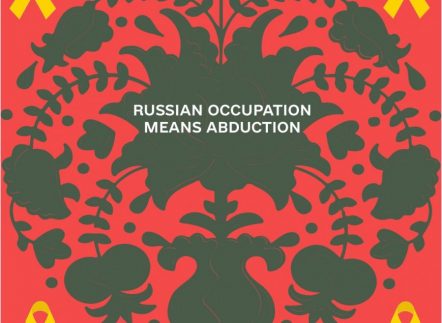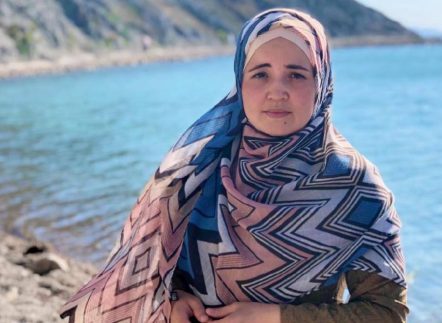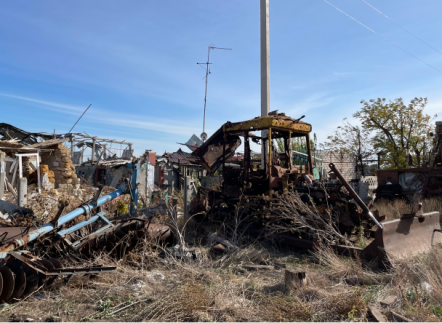Written by: Mariia Panchenko
Project team: Olha Opalenko, Mykyta Biliakov, Nataliia Kaplun, Inna Krat, Oleksandr Leonov, Pavlo Shvab
- The context of human rights violations in the occupied territories of Ukraine.
On February 24, 2022, the armed forces of the Russian Federation carried out a full-scale invasion of Ukraine, which was a continuation and escalation of the international armed conflict that has been going on between Russia and Ukraine since 2014. As a result of the new intensified attack, in addition to the previously occupied regions of Crimea and parts of the Donetsk and Luhansk regions, Russia managed to occupy other territories of Ukraine, including parts of the Kyiv, Chernihiv, Sumy, Kharkiv, Zaporizhzhia, Kherson, Mykolaiv regions and some settlements in the Donetsk and Luhansk regions that had not been occupied before. During the hostilities, the Ukrainian armed forces liberated Kyiv, Chernihiv, Sumy, Mykolaiv, part of the Kherson, and almost all of the Kharkiv regions; other territories are still under Russian occupation.
- Human Rights during armed conflict and international legal obligations of the Russian Federation
During an armed conflict, the legal regime of international humanitarian law (hereinafter referred to as IHL) applies. It defines the rules of war and, among other things, the rules of treatment of protected categories of persons, including the civilian population of the occupied territories. During an armed conflict, IHL, as a lex specialis, prevails over international human rights law (hereinafter – IHRL). However, the IHRL regime mustn’t cease to operate. It is applied in parallel to IHL and continues to protect individuals from abuse or arbitrary exercise of power by state representatives even during the war, although with some limitations.
According to the principle of extraterritorial jurisdiction, a state is responsible for human rights violations by its representatives in any territory over which it has effective control, even if that territory is outside its internationally recognized national borders. Thus, Russia is responsible for human rights violations by its representatives in the occupied territories of Ukraine.
Most recently, Russia was a party to the European Convention on Human Rights of 1950 (hereinafter referred to as the ECHR or the Convention) and thus was subject to the jurisdiction of the ECtHR, which, according to the ECHR, is empowered to consider individual and inter-state applications alleging human rights violations by a State party. However, the Russian Federation withdrew from the Council of Europe on March 16, 2022, and ceased to be a party to the Convention. After September 16, 2022, the ECHR no longer has the legal authority to hold Russia accountable for human rights violations. In other words, Russia has de facto ceased to be part of the European human rights protection system, which has created a legal vacuum: Russian representatives continue to commit human rights violations, but there are no longer any tools to bring them to justice.
However, this does not exempt Russia from its obligations under the IHRL. Firstly, human rights are universally recognized as jus cogens and erga omnes norms, which makes them part of customary international law. In other words, they are universal and binding on any member of the international community, regardless of the presence or absence of obligations under treaty law. Secondly, Russia also has treaty obligations in the field of human rights, as it is a party to the Universal Declaration of Human Rights of 1948 and a party to the vast majority of the main UN conventions protecting human rights, in particular, the following:
- The International Covenant on Civil and Political Rights of 1966 (hereinafter – the ICCPR);
- The International Covenant on Economic, Social and Cultural Rights of 1966;
- The International Convention on the Elimination of All Forms of Racial Discrimination of 1965;
- The Convention on the Elimination of All Forms of Discrimination against Women of 1979;
- The Convention against Torture and Other Cruel, Inhuman or Degrading Treatment or Punishment of 1984;
- The Convention on the Rights of the Child of 1989;
- Convention on the Rights of Persons with Disabilities, 2006.
To implement each of these international documents, a UN treaty-based quasi-judicial body was established to record violations of the rights of persons under the jurisdiction of a state party. Although the decisions of these bodies are advisory and inferior to the force of ECHR judgments, they can be one of the levers of influence on Russia.
Despite its numerous human rights obligations, during the more than nine years of the armed conflict – and especially after February 24, 2022 – there has not been a single rule or prohibition of the IHRL and IHL that Russia has not violated, demonstrating a blatant disregard and complete disrespect for the international legal order and international law.
- Human rights violations in the occupied territories in March 2023
The parts of Ukraine occupied by the Russian Federation remain restricted from access by national and international institutions and organizations studying human rights. Under such conditions, data from social networks, media, etc., is a valuable source of information about everything that happens in these territories.
For a long time, Vostok SOS experts have been monitoring open sources and, based on the information collected, recording human rights violations committed by representatives of the Russian Federation in the occupied territories and publishing monthly reports on the violations.
This report provides an overview of human rights violations committed in the occupied territories of Ukraine in March 2023.
It is important that since the spring of 2022, the number of such violations has not decreased, and the occupying power has not shown any positive dynamics concerning human rights. Representatives of the Russian Federation and its occupation administrations continue to abuse power in the territories of Ukraine temporarily under their control, humiliating the dignity and causing significant harm to the health and well-being of civilians.
The data collected and presented in this report does not claim to be comprehensive and represents only a small percentage of all human rights violations committed in the occupied territories.
- Number and types of human rights violations
In March 2023, Vostok SOS monitors identified 66 cases of human rights violations in the occupied regions of Ukraine. Most violations were recorded in the Luhansk (23) and Zaporizhzhia (20) regions. The figures in other regions are as follows: Kherson region – 18 cases; Crimea – 3; Donetsk region – 2.
The property right was violated most often this month – 42 cases, including 19 in the Luhansk region, 11 in the Zaporizhzhia region, 9 in the Kherson region, and one in the Donetsk region. These figures reflect isolated acts of destruction or misappropriation of civilian property. At the same time, in March 2023, in the city of Mariupol, Donetsk region, the occupation administration continued to destroy entire buildings and even neighborhoods, which is a massive violation of the right to property.
Other common types of violations in the occupied territories in March 2023 include the following:
- the right to liberty and security of person – 18 such cases were recorded in March: 7 – in the Zaporizhzhia region; 4 – in the Kherson region; 4 – in the Luhansk region; 3 – in Crimea;
- right to life – 4 cases, Kherson region;
- prohibition of torture – 2 cases: 1 in the Kherson region and 1 in the Donetsk region;
- freedom of thought, conscience, and religion – 2 cases, Zaporizhzhia region.
- Examples of human rights violations in the occupied territories
The property right
The most widespread human rights violation in the occupied territories in March 2023 was the violation of the right to property. The Russian military, representatives of the local occupation administrations, and members of the L/DPR paramilitary groups systematically misappropriated or destroyed residents’ property.
In March 2023, most such cases were recorded in the Luhansk, Kherson, and Zaporizhzhia regions. First of all, residents complain about the arbitrary appropriation of their property. For example, in the cities of Sievierodonetsk and Lysychansk, as well as in the town of Bilovodsk and several settlements in the Luhansk region, Russian military personnel have moved into civilian apartments and houses without permission and are using their property.
A similar practice can be observed in the Zaporizhzhia region. For example, in Berdiansk, Russian military personnel move into residents’ apartments. In the city of Melitopol, the appropriation of private property is based on the coordinated policy of the local occupation administration, which transfers the apartments of people who have left to collaborators. Also, in Melitopol, during the first decade of March 2023, representatives of the occupation administration included about fifty private apartments in different parts of the city in the list of “ownerless property”.
The Russian military and representatives of the occupation administrations are also appropriating residents’ property in several settlements of the Kherson region. In March, such cases were recorded in the village of Novotroitske and the Skadovsk district.
The Russian military not only seize houses and apartments but also appropriate movable property of residents, including cars. For example, in Rubizhne and the villages of Purdivka and Novoaidar in the Luhansk region, the village of Yakymivka in the Zaporizhzhia region, Skadovsk and the village of Podol-Kalynivka in the Kherson region, Russian military personnel stole several cars from residents.
It has been reported from open sources that the Russian military is taking the looted property to Crimea. In particular, in the village of Myrne, Kherson region, at the Kalanchak railway station, the Russian army organized a channel for the export of looted property from residents: ammunition is unloaded at the station from Crimea, and in the opposite direction, stolen items are transported in freight cars, which are unloaded in Dzhankoi, where they are either sold or taken to Russia.
Article 17 of the Universal Declaration of Human Rights states that “everyone has the right to own property, alone or in association with others” and that “no one shall be arbitrarily deprived of his or her property”.
The right to liberty and security of a person
The second most common violation in the occupied territories is the violation of a person’s right to liberty and security. This right is violated through illegal abductions, arrests, and transfer of civilians to an unknown destination by the Russian military, representatives of the FSB, as well as members of the L/DPR paramilitary groups, and employees of the occupation structures, such as police, security forces, etc.
In March 2023, the Russian military abducted three people in the Kherson region: in the village of Kalanchak, they kidnapped a 60-year-old resident after searching for his home; in the village of Novorossiiske, a man was abducted from his home; in the Skadovsk district, the head of a village was kidnapped. The location of the abducted persons is unknown.
In the Zaporizhzhia region, the occupation authorities continue the illegal deportation of the Ukrainian population. Thus, in March 2023, it became known that representatives of the occupation administration took 5 children from Enerhodar to Moscow. The occupation administration also significantly restricts the freedom of movement of the local population. In particular, in Berdiansk, an order was issued for residents to receive passes from the city commandant’s office by April 1 to move around the Zaporizhzhia region.
In the Luhansk region, in March 2023, representatives of the occupation administration took two minors from Lysychansk to Russia with the subsequent forced change of their citizenship to Russian.
In the occupied Crimea, the persecution of Crimean Tatars by the FSB continues. In particular, in March 2023, representatives of this service detained two people in the city of Sudak and one person – an activist and a citizen journalist – in the village of Urozhaine, Simferopol district, on suspicion of involvement in “sabotage actions”.
Article 9 of the ICCPR states that “everyone has the right to liberty and security of person” and that “no one shall be arbitrarily arrested or detained”.
Prohibition of torture
Torturing civilians in the occupied territories is an integral part of the policy of the Russian invaders and occupation administrations toward the population. In particular, torture is used against people who actively resist the occupation or are suspected of disloyalty to the new government.
For example, in March 2023, in the village of Henichesk, Kherson region, the Russian military tortured residents who refused to get a Russian passport.
Article 7 of the ICCPR states, “no one shall be subjected to torture or cruel, inhuman or degrading treatment or punishment”.
The right to life
Representatives of the Russian Federation torture and arbitrarily kill residents of the occupied territories, violating their right to life.
In March 2023, 4 cases were recorded, all in the Kherson region. At the beginning of the month, Russian troops killed a resident in one of the villages of the Hornostaiiv community. Also, on March 3, three men were killed by a mine in the village of Pravi Solontsi, two of whom were killed. In addition, in the village of Malokakhovka, two people suffering from mental disorders were killed by Russian soldiers: on March 9, the Russian military killed a 50-year-old woman to prevent her from receiving medical care; a man was also found dead after being denied treatment by the Russian army.
Article 6 of the ICCPR states that “the right to life is the inherent right of everyone. This right shall be protected by law. No one shall be arbitrarily deprived of their life”.
Freedom of thought, conscience, and religion
Since the beginning of the occupation, the Russian regime has been implementing a policy of total Russification of the local population, including children in the occupied territories of Ukraine, which can be qualified as a violation of the right to freedom of thought. In March 2023, it became known about such cases, particularly in Berdiansk, Zaporizhzhia region, where representatives of the local occupation administration persecute schoolchildren studying under the Ukrainian school curriculum.
Also, the Russian military and representatives of the occupation administrations continue to violate the right of Ukrainians to freedom of religion. In particular, in the village of Strohanivka, Zaporizhzhia region, in the Church of the Intercession of the Mother of God, priests are forced to conduct services by the canons of the Russian Orthodox Church (Moscow Patriarchate).
Article 18 of the ICCPR states that “everyone has the right to freedom of thought, conscience and religion”. This right also includes the freedom to manifest any religion or belief.
- Comparative analysis of human rights violations recorded in March 2023 with data collected in the previous three months (December 2022-February 2023), conclusions.
For a better understanding of the human rights situation in the occupied territories of Ukraine, let’s compare the data recorded by the monitors in March 2023 with the information on human rights violations collected by them in the previous three months (December 2022, January and February 2023).
Thus, in February 2023, 94 human rights violations were identified based on open-source data. The largest number of cases was recorded in the Zaporizhzhia (38) and Kherson (28) regions. Like this month, the property right was most often violated – 58 cases: 20 in the Kherson region, 20 in the Zaporizhzhia region, 1 in the Donetsk region, and 1 in Crimea. The following most common violations in February were violations of the right to liberty and security of person (14 cases in all occupied regions), the prohibition of torture (10 cases), and the right to life (6 cases).
In January 2023, 118 human rights violations were recorded in all occupied territories, with the highest number of cases in the Kherson (38 cases) and Zaporizhzhia (37 cases) regions. Violations of the property right were also the most common type of violations, accounting for 56 cases out of 118 in all regions: 27 – in the Luhansk region; 13 – in the Kherson region; 11 – in the Zaporizhzhia region; 4 – in the Donetsk region; 1 – in the Autonomous Republic of Crimea. The right to liberty and security of person was violated 33 times; the prohibition of torture – 12 times; the right to life – 11 times.
In December 2022, 87 violations were identified, most of which were committed in the Kherson (35) and Zaporizhzhia (31) regions. The most frequently violated right was the property right – 40 cases: 17 – Kherson region; 12 – Zaporizhzhia region; 8 – Luhansk region; 2 – Donetsk region; 1 – Crimea. The second most common is the right to liberty and security of person – 33 violations on all occupied territories. The right to life was violated 6 times, and the prohibition of torture – 5 times.
A comparative analysis of the information on human rights violations for March 2023 and the last three months (December 2022 – February 2023) allows us to draw the following conclusions:
- the number of human rights violations in the occupied territories is not decreasing and varies from 65 to 120 violations per month. The cases recorded by Vostok SOS monitors make up a small percentage of all human rights violations currently taking place in the occupied territories;
- the most common type of violation is the violation of the right to property of residents of the occupied territories; the second most common is the right to liberty and security of a person. The occupiers also torture and kill civilians in the territories under their control;
- most violations are committed in the Zaporizhzhia and Kherson regions, the territories occupied by Russia due to its full-scale invasion in 2022. Perhaps the high number of human rights violations recorded in these regions does not depend on the intensity of the offenses but on the fact that these regions have been occupied recently and, accordingly, the information space of these territories has not yet been “cleared” by the occupation administration as in Crimea or the territories of the Donetsk and Luhansk regions occupied since 2014;
- responsible for human rights violations are, in particular, the personnel of the Russian Armed Forces, representatives of the FSB, local occupation administrations, the L/DPR IAGs, as well as various paramilitary groups, such as Kadyrov’s men, Wagner’s men, etc. supported and encouraged by Russia.
